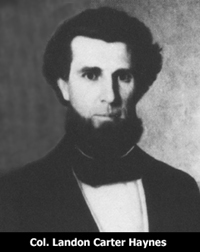Col. Landon Carter Haynes is a familiar name to area history buffs. What is now Johnson City, which began as Johnson’s Tank and Johnson’s Depot, was once briefly identified as Haynesville before officially being renamed Johnson City on Dec. 1, 1869.

Haynes was born in 1816 by the banks of the Watauga River in the Buffalo community of Carter County. During the Civil War, he aligned himself with the Confederate cause. He became a major stockholder in the East Tennessee and Virginia Railway and worked hard to obtain state support for the construction of the rail line.
The well-known lawyer and stump speaker was the brother of Emily Haynes Taylor, wife of Rev. Nathaniel G. Taylor. This celebrated family was the product of “War of the Roses” gubernatorial candidates Bob and Alf Taylor.
An undated Comet newspaper article had lustrous comments to say about Landon: “His celebrated tribute to East Tennessee is a literary gem of such beauty that it bears frequent repetition and should never be forgotten by the local citizens of the Old Volunteer State. It was delivered at a banquet of the local bar (in 1872) at Jackson, Tennessee.”
General Nathan Bedford, toastmaster of the event, introduced Haynes by saying, “I propose the health of Col. Landon C. Haynes of East Tennessee, the country sometimes called God-forsaken.”
Col Haynes, obviously offended by the hurtful remark countered: “Mr. Chairman and Gentlemen: I plead guilty to the ‘swot impeachment.’ I was born in East Tennessee on the banks of the Watauga, which in the Indian vernacular is ‘beautiful river,’ and beautiful river it is. I have stood upon its banks in my childhood and looked down through its glassy waters and have seen a heaven below and then looked up and beheld a heaven above, reflecting like two mirrors, each in the other its moons and its planets and its trembling stars.
“Away from its banks of rocks and cliffs, hemlock and laurel, pine and cedar stretch a vale back to the distant mountain as beautiful and exquisite as any in Italy or Switzerland. There stands the great Unicorn, the Great Roan, the Great Black and the Great Smoky Mountains, among the loftiest in the United States of North America on whose summits the clouds gather of their own accord in the brightest day.
“There I have seen the great spirit of the storm, after noon-tide, take his nap in the pavilion of darkness and clouds. I have then seen him arise at midnight as a giant refreshed with slumber and cover the heavens with gloom and darkness. I have seen him awake the tempest, and let loose the red lightnings that run among the mountain tops for a thousand miles, swifter than an eagle’s flight in the heaven.
“Then I have seen them stand up and dance like angels of light in the clouds to the music of that grand organ of nature, whose keys seemed touched by the fingers of divinity in the hall of eternity, that responded in notes of thunder, which resounded through the universe.
“Then I have seen the darkness drift away beyond the horizon and the morn get up from her saffron bed, like a queen put on her robes of light, come forth from her palace in the sun, and stand up tiptoe on the misty mountain top, and while night fled before her glorious face to his bed chamber at the pole, she lighted the green vale and beautiful river where I was born and played in my childhood with a smile of sunshine. Oh! beautiful land of the mountains, with sun-painted cliff, how can I ever forget thee!”
The Comet concluded by stating that Haynes’ speech left Gen. Forrest in a state of sheer amazement.

Comments are closed.